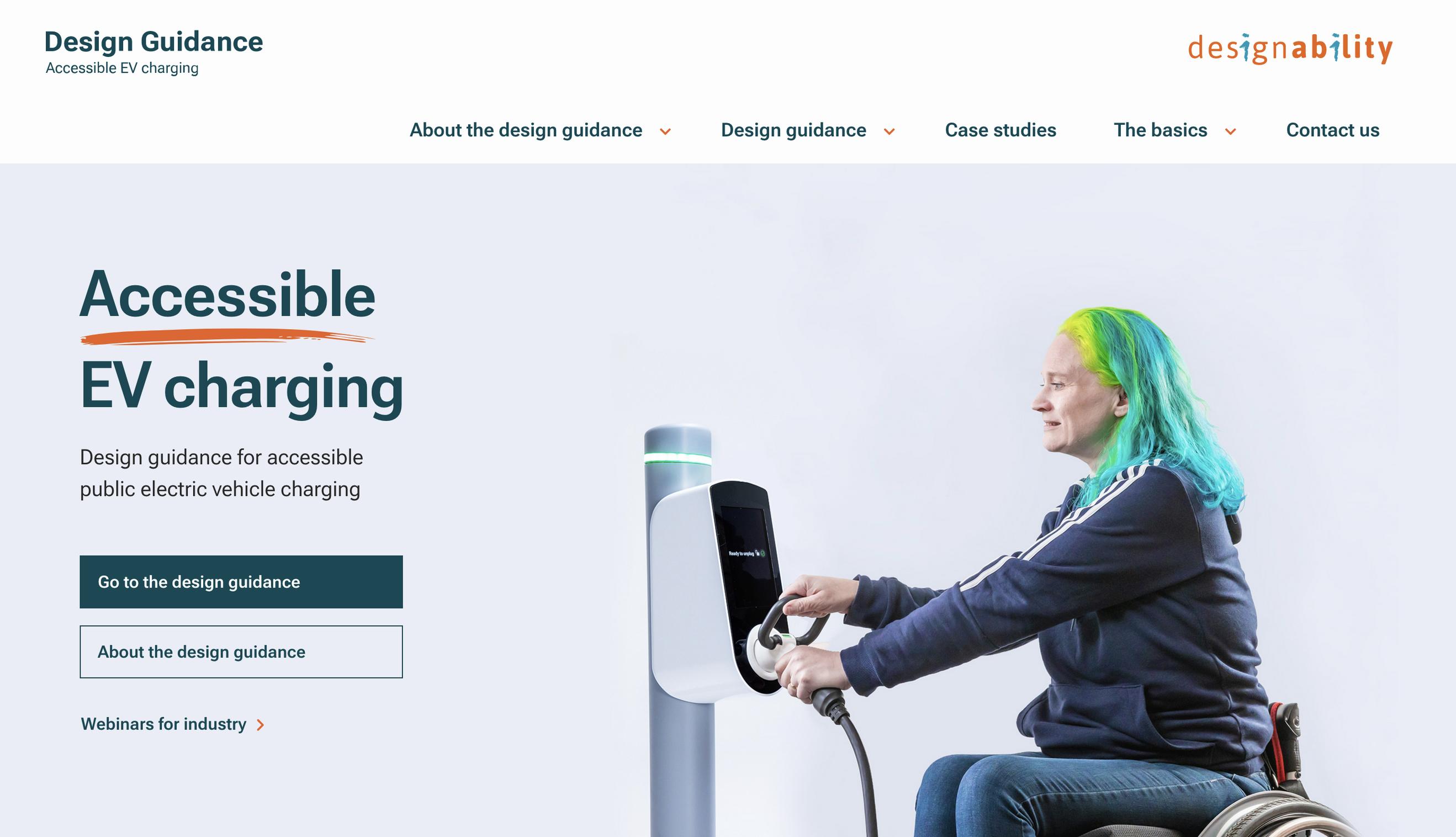

National disability charity Designability has published new guidance for the electric vehicle (EV) charging sector.
It is estimated that by 2035 there will be 2.7 million disabled drivers, with up to 50% (1.3m) expected to be partially or fully reliant on public EV charging. One in five people in the UK are disabled, so there is a huge and urgent need for accessibility, in order for the EV charging network to be fully inclusive and fit-for-purpose.
Motability Foundation and the UK government Office for Zero Emissions Vehicles (OZEV), formed a partnership to co-sponsor the PAS 1899:2022, the new accessibility standard for public EV charging points developed by BSI, in its role as the national standards body (NSB). Motability awarded Designability with grant funding to explore electric vehicle charging solutions for the benefit of disabled drivers. Additionally, Designability sat on the steering group for the PAS.
This October, Motability Foundation announced its endorsement of assessment schemes run by AccessAble and BSI, to check the accessibility of public EV chargepoints.
The assessment schemes will give providers and manufacturers a way of checking if their public chargepoints conform with PAS 1899 Electric vehicles – Accessible charging – Specification.
With the current rapid roll-out of the EV charging infrastructure across the UK, now is a crucial time to ensure the infrastructure is future-proofed. Ensuring accessible public charging now will also avoid costly retrofit later down the line, should regulation come into force.
The free online design guidance from Designability,was informed by evidenced research and user testing, working with disabled people to understand the challenges with current EV chargepoints. The open-source guidance can be accessed by individuals and organisations looking to ensure their design and roll-out of public EV charging delivers what good inclusive design should look like.
“As the roll-out of public EV charge points continues at pace this is accelerating the need for rapid change in EV charging design and installation, to ensure no one is left behind in the transition to electric vehicles,” says Matt Ford, director of design and innovation at Designability.
“Designability were alarmed at the scale of the challenges disabled drivers and passengers face when charging their EVs in public, and so we decided we simply had to act to be a part of the solution. All disabled people should be able to live the life they choose, with greater independence, and feel empowered and included in everyday life.”
The guidance aims to give organisations a better understanding of what accessible public charging looks like in a practical way, and to prepare for assessment schemes. It contains clear, concise information, images and videos to illustrate.
The guidance looks at areas such as: information and signage on where to find the chargers and how to use the chargepoints, lighting the area around the chargepoints, size of parking bays to allow enough space around the vehicle, clear access to amenities like toilets, plus much more such as cable and socket types, along with many design examples from the prototypes we developed as part of the process.
Designability is a national charity that has enabled disabled people to live with greater independence by creating and providing useful products and solutions to disabled people for over 50 years.
The team at Designability are a diverse mix of designers, engineers, occupational therapists, technicians, fundraising and administrative staff. The team use human-centred design to create products with and for disabled people to improve and enrich their lives, giving them greater choice every day.
Designability is known for the Wizzybug Loan Scheme which provides free, fun, powered wheelchairs called Wizzybug to very young children across the UK.
Designability worked in partnership with Motability Foundation on research and user engagement with disabled people, to inform the freely available design guidance for manufacturers, installers, providers and site owners, of public electric vehicle chargepoint infrastructure, to ensure accessibility for all users.
Additionally, the design and engineering team at Designability sat on the steering group for PAS 1899:2022 on accessible EV charging – a new standard from the British Standards Institution (BSI), co-sponsored by Motability Foundation and the Office for Zero Emissions Vehicles (OZEV).
Results from the Motability Foundation endorsed PAS 1899 assessment schemes will be made freely available online, so that disabled people can make informed decisions about where to charge their electric vehicles.
To find out more on the assessment schemes visit the Motability Foundation website
TransportXtra is part of Landor LINKS
© 2026 TransportXtra | Landor LINKS Ltd | All Rights Reserved
Subscriptions, Magazines & Online Access Enquires
[Frequently Asked Questions]
Email: subs.ltt@landor.co.uk | Tel: +44 (0) 20 7091 7959
Shop & Accounts Enquires
Email: accounts@landor.co.uk | Tel: +44 (0) 20 7091 7855
Advertising Sales & Recruitment Enquires
Email: daniel@landor.co.uk | Tel: +44 (0) 20 7091 7861
Events & Conference Enquires
Email: conferences@landor.co.uk | Tel: +44 (0) 20 7091 7865
Press Releases & Editorial Enquires
Email: info@transportxtra.com | Tel: +44 (0) 20 7091 7875
Privacy Policy | Terms and Conditions | Advertise
Web design london by Brainiac Media 2020